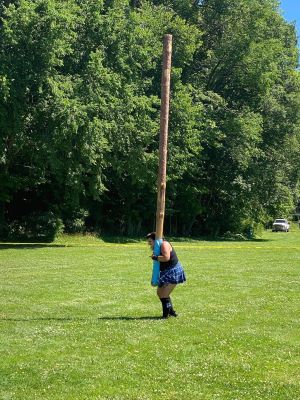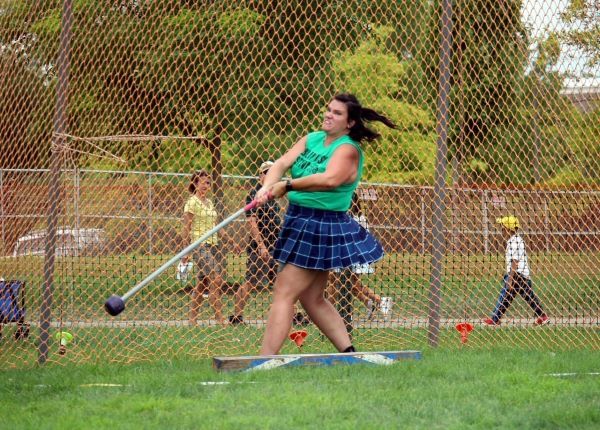At Carle Cancer Institute in Champaign you will find Charli Kahler, RN, bringing comfort to head and neck cancer patients at what could be their most vulnerable time in life.
Yet, when the Scottish Highland Games are underway, a different side of her emerges as she competes in five to six hours of throwing. That could be tossing a 15-foot tall, 65-pound tree trunk 360 degrees, swinging an 18-pound weight on the end of a pole over her head or using a three-pronged pitch fork to toss a 12-pound burlap sack over a bar.
Similar to a decathlon, each “game/competition” is nine throwing events and she must complete all nine events to receive a score and place nationally.
to receive a score and place nationally.
It takes strength and endurance, which she is learning through the Carle Performance Enhancement through Advanced Kinesiology (PEAK) program at Carle Sports Medicine in Champaign.
“I’ve been aware that the games existed since watching the movie “Braveheart.” I was looking for a fitness culture change as well as staying fit with better control of my movements so that I could continue to stay active and healthy in my middle age years. I’m over 40 years old and I want to avoid injuries from my lack of knowledge: that’s where PEAK helps strengthen my movements to prevent injury and allows me to keep moving safely,” Kahler said.
Kahler started working with the PEAK program about eight months ago and she never thought she would progress the way she has. “It has been life-changing for me,” she said.
Kahler is among clients who signed up for the fee-for-service PEAK training that evaluates individuals and works with them to gain or maintain strength and mobility. She can attest that referrals aren’t necessary, and anyone can work with this program to achieve their individual goals.
Kahler has some very specific goals because of the competitions. Twice a week for an hour, she receives a 1:1 workout designed around her goals for the season, which lately is increasing stamina in competitions, the ability to throw heavy weights and preventing injury. She attributes her success to the athletic trainers (AT) at the PEAK program, Christopher Danbury, MS, ATC, CSCS, and Aaron Alford, ATC, who designed her training program.
“After each competition I watch videos to see where my throwing form was “off” (i.e. not enough speed, not getting low enough, over utilizing my shoulder instead of my core). My PEAK athletic trainer takes this feedback and designs my workout activities for that week to strengthen and correct where I was struggling in competition the previous week. Workouts are never the same. I went from repetitions with a 15-pound kettlebell to repetitions with a 30-pound kettlebell,” she said.
She is most grateful for the athletic trainers who work with her to ensure she trains properly. “The athletic trainers really focus on my needs and what I am hoping to accomplish in competition,” Kahler said. “They focus on the individual competitions that I sign up for and help me to train so that I don’t injure myself, and that means everything.”
Athletic trainer Danbury said, “Anybody can participate in the PEAK training program. We help everyone from a first time user to collegiate athletes.”
“You have to move well, then strong and then you can move fast,” he said. “We focus on movement patterns for the first couple of weeks. If and when we start adding weight and resistance training, we move safely first and foremost. Then we work on moving fast and for competition.”
“They are so good at it," Kahler said. "Their scope of knowledge is pretty profound. I will tell them what I experienced or felt during the competition, and Danbury will incorporate an entirely new exercise to help me get through that.”
Kahler said the athletic trainers have the expertise and the know-how to improve you from start to stop. She believes it is a win-win.
“Our main goals for our athletes is to restore core functional movement patterns,” Alford said. “Most of the time that is the root outcome when working to improve strength and mobility.”
Kahler said the games are also a perfect complement to a hectic work-life-workout balance.
Danbury and Alford said the program focuses on sports and everyday life with trained healthcare professionals who follow COVID-19 safety recommendations from the Centers for Disease Control (CDC) and the Illinois Department of Public Health (IDPH).
Appointments are available every half hour, and a session with an athletic trainer lasts an hour. Sessions can be once a week or more. It depends on the need agreed to by the client and athletic trainer. For more information about the PEAK training and other programs offered for performance enhancement, please email orthosportsffs@carle.com or call (217) 383- 9756.
Yet, when the Scottish Highland Games are underway, a different side of her emerges as she competes in five to six hours of throwing. That could be tossing a 15-foot tall, 65-pound tree trunk 360 degrees, swinging an 18-pound weight on the end of a pole over her head or using a three-pronged pitch fork to toss a 12-pound burlap sack over a bar.
Similar to a decathlon, each “game/competition” is nine throwing events and she must complete all nine events
 to receive a score and place nationally.
to receive a score and place nationally.It takes strength and endurance, which she is learning through the Carle Performance Enhancement through Advanced Kinesiology (PEAK) program at Carle Sports Medicine in Champaign.
“I’ve been aware that the games existed since watching the movie “Braveheart.” I was looking for a fitness culture change as well as staying fit with better control of my movements so that I could continue to stay active and healthy in my middle age years. I’m over 40 years old and I want to avoid injuries from my lack of knowledge: that’s where PEAK helps strengthen my movements to prevent injury and allows me to keep moving safely,” Kahler said.
Kahler started working with the PEAK program about eight months ago and she never thought she would progress the way she has. “It has been life-changing for me,” she said.
Kahler is among clients who signed up for the fee-for-service PEAK training that evaluates individuals and works with them to gain or maintain strength and mobility. She can attest that referrals aren’t necessary, and anyone can work with this program to achieve their individual goals.
Kahler has some very specific goals because of the competitions. Twice a week for an hour, she receives a 1:1 workout designed around her goals for the season, which lately is increasing stamina in competitions, the ability to throw heavy weights and preventing injury. She attributes her success to the athletic trainers (AT) at the PEAK program, Christopher Danbury, MS, ATC, CSCS, and Aaron Alford, ATC, who designed her training program.
“After each competition I watch videos to see where my throwing form was “off” (i.e. not enough speed, not getting low enough, over utilizing my shoulder instead of my core). My PEAK athletic trainer takes this feedback and designs my workout activities for that week to strengthen and correct where I was struggling in competition the previous week. Workouts are never the same. I went from repetitions with a 15-pound kettlebell to repetitions with a 30-pound kettlebell,” she said.
She is most grateful for the athletic trainers who work with her to ensure she trains properly. “The athletic trainers really focus on my needs and what I am hoping to accomplish in competition,” Kahler said. “They focus on the individual competitions that I sign up for and help me to train so that I don’t injure myself, and that means everything.”
Athletic trainer Danbury said, “Anybody can participate in the PEAK training program. We help everyone from a first time user to collegiate athletes.”
“You have to move well, then strong and then you can move fast,” he said. “We focus on movement patterns for the first couple of weeks. If and when we start adding weight and resistance training, we move safely first and foremost. Then we work on moving fast and for competition.”
“They are so good at it," Kahler said. "Their scope of knowledge is pretty profound. I will tell them what I experienced or felt during the competition, and Danbury will incorporate an entirely new exercise to help me get through that.”
Kahler said the athletic trainers have the expertise and the know-how to improve you from start to stop. She believes it is a win-win.
“Our main goals for our athletes is to restore core functional movement patterns,” Alford said. “Most of the time that is the root outcome when working to improve strength and mobility.”
Kahler said the games are also a perfect complement to a hectic work-life-workout balance.
Danbury and Alford said the program focuses on sports and everyday life with trained healthcare professionals who follow COVID-19 safety recommendations from the Centers for Disease Control (CDC) and the Illinois Department of Public Health (IDPH).
Appointments are available every half hour, and a session with an athletic trainer lasts an hour. Sessions can be once a week or more. It depends on the need agreed to by the client and athletic trainer. For more information about the PEAK training and other programs offered for performance enhancement, please email orthosportsffs@carle.com or call (217) 383- 9756.
Categories: Staying Healthy, Community
Tags: Carle Cancer Institute, Champaign-Urbana, Sports Medicine
